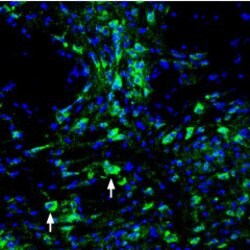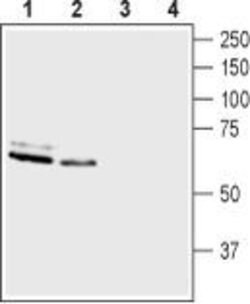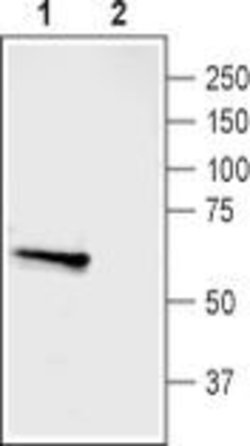Learn More
ASIC3 Polyclonal Antibody, Invitrogen™
Guinea Pig Polyclonal Antibody
Supplier: Thermo Scientific PA5111817
Description
Reconstitute antibody with 50 μL of double distilled water (DDW). The reconstituted solution can be stored at 4 degrees C for up to 1 week. For longer periods, small aliquots should be stored at -20 degrees C. Avoid multiple freezing and thawing. Centrifuge all antibody preparations before use (10000 x g 5 min). Peptide sequence is: KPRSGLEEAQ RRQAS(C) Homology: Mouse - 14/15 amino acid residues identical; human - 11/15 amino acid residues identical.
ACCN3 encodes a member of the degenerin/epithelial sodium channel (DEG/ENaC) superfamily. The members of this family are amiloride-sensitive sodium channels that contain intracellular N and C termini, two hydrophobic transmembrane regions, and a large extracellular loop, which has many cysteine residues with conserved spacing. ACCN3 encodes a member that is an acid sensor and may play an important role in the detection of lasting pH changes. In addition, a heteromeric association between this member and ACCN1 has been observed as proton-gated channels sensitive to gadolinium.
Specifications
| ASIC3 | |
| Polyclonal | |
| Unconjugated | |
| ASIC3 | |
| ACCN3; Acid-sensing ion channel 3; Amiloride-sensitive cation channel 3; ASIC3; AW742291; BOS_4613; Dorsal root ASIC; Drasic; hASIC3; hTNaC1; Neuronal amiloride-sensitive cation channel 3; SLNAC1; Testis sodium channel 1; TNAC1 | |
| Guinea Pig | |
| Antigen affinity chromatography | |
| RUO | |
| 171209, 286920 | |
| -20°C | |
| Lyophilized |
| Immunocytochemistry, Immunofluorescence, Immunohistochemistry (Frozen), Western Blot | |
| 0.8 mg/mL | |
| PBS with 1% BSA and 0.05% sodium azide; pH 7.4 | |
| O35240, Q6X1Y6 | |
| ASIC3 | |
| Peptide corresponding to amino acid residues 2-16 of rat ASIC3 (Intracellular, N-terminus) | |
| 50 μL | |
| Primary | |
| Mouse, Rat | |
| Antibody | |
| IgG |
Your input is important to us. Please complete this form to provide feedback related to the content on this product.


